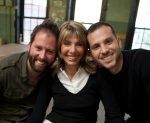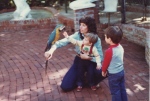A mother wrote to me: Two of my three children are addicted to drugs and my life has been inextricably altered. The relationship between mother and addicted child is unique, but I know that that does not diminish the experiences of other family members. Through group work, I talked with another mother who just found out that her child is addicted. She is panicked, confused, and said that she feels isolated, alone, shamed, scared and angry. I realized that I am not alone.
My thoughts on the above passage: There are four S’s used with addiction: shame, secrets, silence and stigma. We feel as though we are drowning in our own emotions and we don’t know what to do. I kept the secret of my son’s addiction because I felt shame. In silence, the addiction grew. But when I reached out my hand for help, I realized I was not alone.
Today’s Promise: I will join together and bring addiction out of the shadows so it can be healed. My loved one is fighting a powerful force and I will talk with other mothers and fathers and break the silence. In our pain, I will understand; in our stories, I will find hope; in our love, I will continue to believe.











9 Comments.
View Comments | Leave a Comment